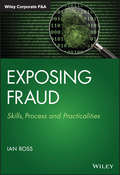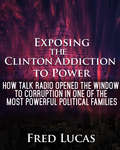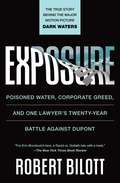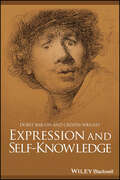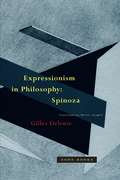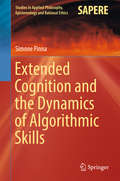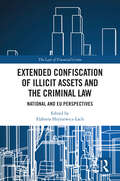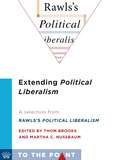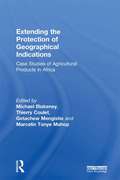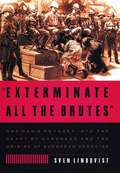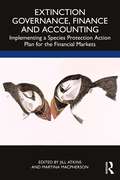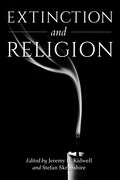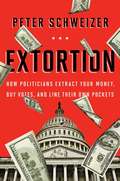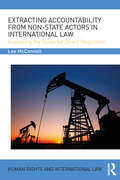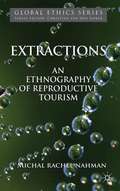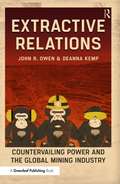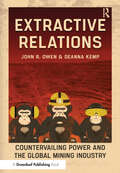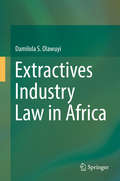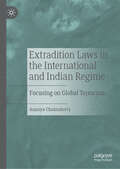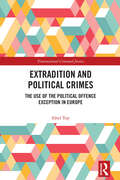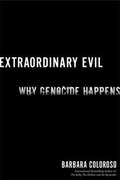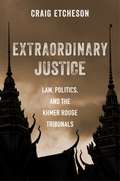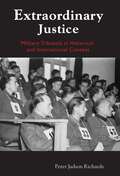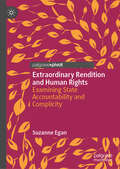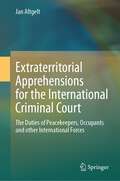- Table View
- List View
Exposing Fraud
by Ian RossForeword by James D. Ratley, CFE, President and CEO, Association of Certified Fraud Examiners Beyond the basics--tools for applied fraud management In Exposing Fraud: Skills, Process, and Practicalities, anti-fraud expert Ian Ross provides both ideas and practical guidelines for applying sound techniques for fraud investigation and detection and related project management. The investigative principles in this book are truly universal and can be applied anywhere in the world to deal with any of the range of fraud types prevalent in today's business environments. Topics covered include cyber fraud, the psychology of fraud, data analysis techniques, and the role of corporate and international culture in criminal behavior, among many others. Ensure an optimal outcome to fraud investigations by mastering real-world skills, from interviewing and handling evidence to conducting criminal proceedings. As technologies and fraud techniques become more complex, fraud investigation must increase in complexity as well. However, this does not mean that time-tested strategies for detecting criminals have become obsolete. Instead, it means that a hands-on approach to fraud detection and management is needed more than ever. The book does just that: Takes a unique practical approach to the business of detecting, understanding, and dealing with fraud of all types Aids in the development of key skills, including conducting investigations and managing fraud risk Covers issues related to ethically and efficiently handling impulsive and systemic fraud, plus investigating criminals who may be running multiple scams Addresses fraud from a global perspective, considering cultural and psychological factors that influence fraudsters Unlike other fraud investigation books on the market, Exposing Fraud develops the ethical and legal foundation required to apply theory and advice in real-world settings. From the simple to the complex, this book demonstrates the most effective application of anti-fraud techniques.
Exposing the Clinton Addiction to Power
by Fred LucasThe subject of FBI investigations and the leaders of the most controversial political organization in America, the Clintons have long been the subject of talk radio. Fred Lucas opens up those conversations that tore open the secrets currently being examined by the FBI. For those interested in the dynamics of Washington politics, the undercurrents of the Establishment and the lust for power that moves those who practice politics in Washington today, Fred Lucas brings those readers into the mix.
Exposure: Poisoned Water, Corporate Greed, and One Lawyer's Twenty-Year Battle against DuPont
by Robert Bilott&“For Erin Brockovich fans, a David vs. Goliath tale with a twist&” (The New York Times Book Review)—the incredible true story of the lawyer who spent two decades building a case against DuPont for its use of the hazardous chemical PFOA, uncovering the worst case of environmental contamination in history—affecting virtually every person on the planet—and the conspiracy that kept it a secret for sixty years. The story that inspired Dark Waters, the major motion picture from Focus Features starring Mark Ruffalo and Anne Hathaway, directed by Todd Haynes.1998: Rob Bilott is a young lawyer specializing in helping big corporations stay on the right side of environmental laws and regulations. Then he gets a phone call from a West Virginia farmer named Earl Tennant, who is convinced the creek on his property is being poisoned by runoff from a neighboring DuPont landfill, causing his cattle and the surrounding wildlife to die in hideous ways. Earl hasn&’t even been able to get a water sample tested by any state or federal regulatory agency or find a local lawyer willing to take the case. As soon as they hear the name DuPont—the area&’s largest employer—they shut him down. Once Rob sees the thick, foamy water that bubbles into the creek, the gruesome effects it seems to have on livestock, and the disturbing frequency of cancer and other health problems in the area, he&’s persuaded to fight against the type of corporation his firm routinely represents. After intense legal wrangling, Rob ultimately gains access to hundreds of thousands of pages of DuPont documents, some of them fifty years old, that reveal the company has been holding onto decades of studies proving the harmful effects of a chemical called PFOA, used in making Teflon. PFOA is often called a &“forever chemical,&” because once in the environment, it does not break down or degrade for millions of years, contaminating the planet forever. The case of one farmer soon spawns a class action suit on behalf of seventy thousand residents—and the shocking realization that virtually every person on the planet has been exposed to PFOA and carries the chemical in his or her blood. What emerges is a riveting legal drama &“in the grand tradition of Jonathan Harr&’s A Civil Action&” (Booklist, starred review) about malice and manipulation, the failings of environmental regulation; and one lawyer&’s twenty-year struggle to expose the truth about this previously unknown—and still unregulated—chemical that we all have inside us.
Expression and Self-Knowledge (Great Debates in Philosophy)
by Crispin Wright Dorit Bar-OnProvides a timely and original contribution to the debate surrounding privileged self-knowledge Contemporary epistemologists and philosophers of mind continue to find puzzling the nature and source of privileged self-knowledge: the ordinary and effortless ‘first-person’ knowledge we have of our own sensations, moods, emotions, beliefs, desires, and hopes. In Expression and Self-Knowledge, Dorit Bar-On and Crispin Wright articulate their joint dissatisfaction with extant accounts of self-knowledge and engage in a sustained and substantial critical debate over the merits of an expressivist approach to the topic. The authors incorporate cutting-edge research while defending their own alternatives to existing approaches to so-called ‘first-person privilege’. Bar-On defends her neo-expressivist account, addressing the objection that neo-expressivism fails to provide an adequate epistemology of ordinary self-knowledge, and addresses new objections levelled by Wright. Wright then presents an alternative pluralist approach, and Bar-On argues in response that pluralism faces difficulties neo-expressivism avoids. Providing invaluable insights on a hotly debated topic in epistemology and philosophy of mind, Expression and Self-Knowledge: Presents an in-depth debate between two leading philosophers over the expressivist approach Offers novel developments and penetrating criticisms of the authors' respective views Features two different perspectives on the influential remarks on expression and self-knowledge found in Wittgenstein’s later writings Includes four jointly written chapters that offer a critical overview of prominent existing accounts, which provide a useful advanced introduction to the subject.Expression and Self-Knowledge is essential reading for epistemologists, philosophers of mind and language, psychologists with an interest in self-knowledge, and researchers and graduate students working in expression, expressivism, and self-knowledge.
Expressionism in Philosophy: Spinoza
by Gilles DeleuzeIn this remarkable work, Gilles Deleuze, the renowned French philosopher, reflects on one of the thinkers of the past who most influenced his own sweeping reconfiguration of the tasks of philosophy. For Deleuze, Spinoza, along with Nietzsche and Lucretius, conceived of philosophy as an enterprise of liberation and radical demystification. He locates in Spinoza “a set of affects, a kinetic determination, an impulse” and makes Spinoza into “an encounter, a passion.”Expressionism in Philosophy was the culmination of a series of monographic studies by Deleuze (on Hume, Bergson, Nietzsche, Proust, Kant, and Sacher-Masoch) and prepared the transition from these abstract treatments of historical schemes of experience to the nomadology of Capitalism and Schizophrenia (Anti-Oedipus and A Thousand Plateaus, co-authored with Félix Guattari). Thus, Expressionism in Philosophy is both a pivotal reading of Spinoza’s work and a crucial text within the development of Deleuze’s thought.
Extended Cognition and the Dynamics of Algorithmic Skills
by Simone PinnaThis book describes a novel methodology for studying algorithmic skills, intended as cognitive activities related to rule-based symbolic transformation, and argues that some human computational abilities may be interpreted and analyzed as genuine examples of extended cognition. It shows that the performance of these abilities relies not only on innate neurocognitive systems or language-related skills, but also on external tools and general agent-environment interactions. Further, it asserts that a low-level analysis, based on a set of core neurocognitive systems linking numbers and language, is not sufficient to explain some specific forms of high-level numerical skills, like those involved in algorithm execution. To this end, it reports on the design of a cognitive architecture for modeling all the relevant features involved in the execution of algorithmic strategies, including external tools, such as paper and pencils. The first part of the book discusses the philosophical premises for endorsing and justifying a position in philosophy of mind that links a modified form of computationalism with some recent theoretical and scientific developments, like those introduced by the so-called dynamical approach to cognition. The second part is dedicated to the description of a Turing-machine-inspired cognitive architecture, expressly designed to formalize all kinds of algorithmic strategies.
Extended Confiscation of Illicit Assets and the Criminal Law: National and EU Perspectives (The Law of Financial Crime)
by Elżbieta Hryniewicz-LachThe European Union is developing instruments which allow law enforcement and judicial authorities to freeze, seize and confiscate illicit assets in a simplified way. Oversimplification of confiscation procedures may, however, result in violation of fundamental rights and general principles of law aimed at ensuring protection of individuals against interference from the State. Such risk exists in particular in the case of extended confiscation, where assets forfeited go beyond what is proven as resulting from a concrete criminal offence. This book drawing on the results of a large international project, brings together a group of experts to determine the requirements needed to achieve compliance of extended confiscation with the fundamental rights and legal principles included in the Charter of Fundamental Rights of the EU, European Convention of Human Rights and in national legal orders of the EU Member States. Divided into three parts, the first details the national perspectives of 14 countries. The second part presents analysis of extended confiscation in comparative terms. The third and final parts examine extended confiscation in the context of the EU criminal law. The book thus provides a detailed analysis of extended confiscation from a number of perspectives and will be an invaluable resource for academics, researchers and policymakers working in the areas of Financial Crime, Comparative Criminal Justice and Human Rights Law.
Extending Political Liberalism: A Selection from Rawls's Political Liberalism, edited by Thom Brooks and Martha C. Nussbaum (To the Point)
by Martha C. NussbaumWidely hailed as one of the most significant works in modern political philosophy, John Rawls's Political Liberalism (1993) defended a powerful vision of society that respects reasonable ways of life, both religious and secular. These core values have never been more critical as anxiety grows over political and religious difference and new restrictions are placed on peaceful protest and individual expression. In her introduction to the volume, Martha Nussbaum discusses the main themes of Political Liberalism and puts them into the context of contemporary philosophical debates.
Extending the Protection of Geographical Indications: Case Studies of Agricultural Products in Africa
by Michael Blakeney Thierry Coulet Getachew Mengistie Marcelin Tonye MahopThe TRIPS Agreement (for trade-related intellectual property rights) provides for the general protection of geographical indications (GIs) of product origin, including for example the special protection of wines and spirits and for the creation of a multilateral register for wines. The African Group of countries has been in the forefront of countries agitating in the World Trade Organization TRIPS Council for the extension of this special protection and of the multilateral register to industries which are of interest to developing countries, primarily agriculture. The so-called "extension question" is the central feature of the Doha Development Agenda at both the WTO and World Intellectual Property Organization. This book provides some empirical evidence and applied legal and economic reasoning to this debate. It provides both a general review of the key issues and a series of case studies from six Anglophone and four Francophone countries in Africa. These focus on major agricultural commodities such as coffee, cotton, cocoa and tea, as well as more specific and local products such as Argan oil and Oku white honey.
Exterminate All the Brutes: One Man's Odyssey into the Heart of Darkness and the Origins of European Genocide
by Joan Tate Sven LindqvistChosen as one of the New Internationalist's best books of the year, "Exterminate All the Brutes" is a searching examination of Europe's dark history in Africa and the origins of genocide. Using Joseph Conrad's "Heart of Darkness" as his point of departure, Sven Lindqvist takes us on a haunting tour through the colonial past, interwoven with a modern-day travelogue. By retracing the steps of European explorers, missionaries, politicians, and historians in Africa from the late eighteenth century onward, the author exposes the roots of genocide in Africa via his own journey through the Saharan desert.
Extinction Governance, Finance and Accounting: Implementing a Species Protection Action Plan for the Financial Markets
by Jill AtkinsThe planet is currently experiencing a mass extinction event, with human and business activity being the root cause of species loss and habitat destruction. Industries, companies, banks, investors, accountants and auditors have all played their role. This book explores how they can also provide a solution. The book presents plans, metrics, frameworks, mechanisms and financial innovations that can be, and are being, implemented through the financial markets in order to save and protect species, enhance biodiversity and, at the same time, preserve the financial markets and the business world. This biodiversity handbook addresses the intersection between species extinction and the global capitalist system. With contributions from leading non-governmental organisations such as the Capitals Coalition, Business for Nature, the Ecojustice Foundation, ShareAction and the Endangered Wildlife Trust, plus senior researchers in the field, as well as industry experts from Moody’s, EOS at Hermes Federated Investment Management, BlueBay Asset Management, ODDO BHF Asset Management and OSSIAM (to mention just a few), this book is at the forefront of addressing the crucially important topics of extinction accounting, finance and governance. Drawing on leading research, the book is written in an accessible style and is relevant to researchers and students in the fields of sustainability, governance, accounting, finance, corporate social responsibility and corporate governance. It is essential reading for investors, responsible investors, bankers, business leaders and policy makers in the field of sustainable financial markets. Given the interdisciplinary nature of this book, it is useful to conservationists, ecologists and others involved in species and biodiversity protection.
Extinction and Religion (Religion and the Human)
by Timothy B. Leduc Catherine Keller Maria Nita Lisa H. Sideris Willis Jenkins Catherine Rigby James HatleyHuman-caused extinctions have never been so prominent in our political and cultural landscape. Extinction and Religion is a collection of wide-ranging chapters that explore the implications for religious faith and experience as it relates to a "sixth mass extinction" in Earth's history. Further it seeks to answer the question as to how religious and spiritual practices are shaping responses to the crisis?Edited by Jeremy H. Kidwell and Stefan Skrimshire, this collection aims to set a new postsecular agenda, articulating the questions, challenges, and ways forward for thinking about religion in an age of mass extinction rather than provide responses from world religions in isolation. It covers subjects such as the multitude of challenges posed by mass extinction to beliefs about the future of humanity, death and the afterlife, the integrity of creation, and the relationship between human and nonhuman life.Wide ranging and incisive, Extinction and Religion amply demonstrates the many ways in which the threat of extinction profoundly affects our faith and religious life worlds.
Extortion: How Politicians Extract Your Money, Buy Votes, and Line Their Own Pockets
by Peter SchweizerA bombshell investigation reveals how Washington really works: politicians extort money from us, then use it to buy each other’s votes. Best-selling author Peter Schweizer reveals: *Obama’s "Protection Money": How the Obama Administration targeted industries for criminal investigation but chose not to pursue key political donors. *John Boehner’s "Tollbooth": How the Speaker of the House extracts money by soliciting political donations before he will hold crucial votes on the House floor. *The "Slush Fund": How politicians extract "campaign contributions" and then convert them to bankroll lavish lifestyles complete with limos, private jets, golf at five-star resorts, fine wines, and cash for family members. *Capitol Hill’s "Underground Economy": How congressmen use a little-known loophole that allows them to secretly link their votes to cash. Extortion finally makes clear why Congress is so dysfunctional: it’s all about making money, not making law.
Extracting Accountability from Non-State Actors in International Law: Assessing the Scope for Direct Regulation (Human Rights and International Law)
by Lee James McConnellThe human rights of communities in many resource-rich, weak governance States are adversely affected, not only by the acts of States and their agents, but also by powerful non-State actors. Contemporary phenomena such as globalisation, privatisation and the proliferation of internal armed conflict have all contributed to the increasing public influence of these entities and the correlative decline in State power. This book responds to the persistent challenges stemming from non-State actors linked to extractive industries. In light of the intersecting roles of multinational enterprises and non-State armed groups in this context, these actors are adopted as the primary analytical vehicles. The operations of these entities highlight the practical flaws of existing accountability regimes and permit an exploration of the theoretical challenges that preclude their direct legal regulation at the international level. Drawing insights from discursive democracy, compliance theories and the Pure Theory of Law, the book establishes a conceptual foundation for the creation of binding international obligations addressing non-State actors. Responding to the recent calls for a binding business and human rights treaty at the UN Human Rights Council, and the growing influence of armed non-State actors, the book makes a timely contribution to debates surrounding the direction of future developments in the field of international human rights law.
Extractions
by Michal Rachel NahmanMichal Nahman traces different kinds of 'extraction': the practices of human egg harvesting in different national contexts; the political economic consequences of such extraction for the women involved and the ways in which this has consequences for nationalism and race or 'Israeli extraction'.
Extractive Relations: Countervailing Power and the Global Mining Industry
by John R. Owen Deanna KempExtractive Relations explores the nature of industrial power and its role in shaping what we understand to be the global mining sector. The authors examine issues at the forefront of contemporary debates: corporate obligations in safeguarding the rights of people displaced by mining, the recognition of community rights and interests in supporting or opposing mining developments, the handling of non-judicial grievances and workability of corporate remedy systems, and the logic of community relations departments in navigating these issues inside and outside of the typical modern mining establishment. The authors develop a unique theoretical approach that highlights the different types and uses of power in these settings. This perspective is supported by the authors' own sustained engagement with the mining sector over many years, drawing on cases from over twenty countries. The analysis of these issues from both 'inside' and 'outside' the sector is a key point of differentiation. For readers seeking to understand how mining companies interpret and interact with the communities and interests around their operations, this book provides invaluable insight and analysis.
Extractive Relations: Countervailing Power and the Global Mining Industry
by John R. Owen Deanna KempExtractive Relations explores the nature of industrial power and its role in shaping what we understand to be the global mining sector. The authors examine issues at the forefront of contemporary debates: corporate obligations in safeguarding the rights of people displaced by mining, the recognition of community rights and interests in supporting or opposing mining developments, the handling of non-judicial grievances and workability of corporate remedy systems, and the logic of community relations departments in navigating these issues inside and outside of the typical modern mining establishment. The authors develop a unique theoretical approach that highlights the different types and uses of power in these settings. This perspective is supported by the authors' own sustained engagement with the mining sector over many years, drawing on cases from over twenty countries. The analysis of these issues from both 'inside' and 'outside' the sector is a key point of differentiation. For readers seeking to understand how mining companies interpret and interact with the communities and interests around their operations, this book provides invaluable insight and analysis.
Extractives Industry Law in Africa
by Damilola S. OlawuyiThe book provides a systematic examination of the legal, fiscal and institutional frameworks for the commercial development of petroleum and solid mineral resources in Africa. First, it considers the values, assumptions, and guiding principles underpinning legislation and governance in Africa’s extractive sector. It then provides detailed and comparative evaluations of regulatory frameworks, pricing, local content, procurement, sales, and contractual arrangements across African extractive industries. Further, the book assesses how questions of business and human rights risks, accountability, corporate social responsibility, waste and pollution control, environmental justice, and participatory development have been addressed to date, and how they could be addressed better in the future. Enhancing readers’ understanding of the geography, sources and scope of extractive resources in Africa, the book explains how corporations can effectively identify, mitigate and prevent legal and business risks when investing in African extractive industries. Lastly, it discusses the innovative legal strategies and tools needed to achieve a sustainable and rights-based extractive industry.Written in a user-friendly style, the book offers a valuable resource for corporations, investors, environmental and human rights administrators, advocates, policymakers, judges, international negotiators, government officials and consultants who advise on, or are interested in, petroleum and solid mineral investments in Africa. It also offers students and researchers an authoritative guidebook to the current state of extractive industry laws and institutions in Africa. Numerous examples of how international legal norms could be used to help revitalize the underlying legal and fiscal regimes in African extractive industries – to make them more robust, accountable, sustainable and rights-based – round out the coverage
Extradition Laws in the International and Indian Regime: Focusing on Global Terrorism
by Ananya ChakrabortyThe book examines the international treaty regimes and the Indian laws in depth. It also looks into the landmark cases, decided by both, the domestic courts in India and the international tribunals. The book would give an understanding between the concepts of extradition in relation to terrorism-related cases. It would provide an in-depth understanding of the inter-relatedness of the various branches of International law and the municipal laws as well.
Extradition and Political Crimes: The Use of the Political Offence Exception in Europe (Transnational Criminal Justice)
by Sibel TopThis book examines the evolution and current application of the political offence exception clause to extradition in Europe.The long-standing academic exploration of terrorism has recently given way to renewed interest in the political offence exception to extradition, prompted by recent events that signal a democratic downturn globally. Despite the significant curtailment – and, in some cases, the complete abolition – of the political offence exception to extradition in Europe, certain European states continue to quietly implement this exception to deny extradition requests. This work studies the development of the political offence exception in Europe by narrowing its focus from an international perspective to the European context, specifically examining the Council of Europe and the European Union, before zeroing in on the Catalan independence crisis, which offers a particularly valuable case for analysing the application of the political offence exception in the European context.By providing a detailed examination of the evolving protections for political offenders within European legal frameworks, the text updates the long overdue academic knowledge on the matter. It is therefore an essential resource for anyone interested in European criminal law and extradition, in particular. It will also be of interest to researchers, academics, and policy-makers working in the areas of criminal law, human rights law, legal theory, criminology, and political science.
Extraordinary Evil: A Short Walk To Genocide
by Barbara ColorosoFrom best-selling author Barbara Coloroso comes a timely and essential book about genocide. Through an examination of three clearly defined genocides ? the Armenian and Rwandan genocides, and the European Holocaust ? Coloroso deconstructs the causes and consequences, both to its immediate victims and to the fabric of the world at large, and proposes the conditions that must exist in order to eradicate this evil from the world. Coloroso is well known for her best-selling books that explore why children bully. In Extraordinary Evil she builds upon that research to explain why the impulse to bully is mirrored by the act of genocide. By linking the psychology of the bully to the motivation that leads a community to murder, Coloroso provides devastating and vital insight into why people kill their neighbors. Based on the author's 15 years of research and extensive travel, Extraordinary Evil is an urgently needed work in an age when acts of genocide seem to occur more frequently and are in the public's consciousness more than ever before.
Extraordinary Justice: Law, Politics, and the Khmer Rouge Tribunals
by Craig EtchesonIn just a few short years, the Khmer Rouge presided over one of the twentieth century’s cruelest reigns of terror. Since its 1979 overthrow, there have been several attempts to hold the perpetrators accountable, from a People’s Revolutionary Tribunal shortly afterward through the early 2000s Extraordinary Chambers in the Courts of Cambodia, also known as the Khmer Rouge Tribunal. Extraordinary Justice offers a definitive account of the quest for justice in Cambodia that uses this history to develop a theoretical framework for understanding the interaction between law and politics in war crimes tribunals.Craig Etcheson, one of the world’s foremost experts on the Cambodian genocide and its aftermath, draws on decades of experience to trace the evolution of transitional justice in the country from the late 1970s to the present. He considers how war crimes tribunals come into existence, how they operate and unfold, and what happens in their wake. Etcheson argues that the concepts of legality that hold sway in such tribunals should be understood in terms of their orientation toward politics, both in the Khmer Rouge Tribunal and generally. A magisterial chronicle of the inner workings of postconflict justice, Extraordinary Justice challenges understandings of the relationship between politics and the law, with important implications for the future of attempts to seek accountability for crimes against humanity.
Extraordinary Justice: Military Tribunals in Historical and International Context
by Peter Judson RichardsExamines the ways military tribunals seek to administer justiceThe Al-Qaeda terror attacks of September 11, 2001 aroused a number of extraordinary counter measures in response, including an executive order authorizing the creation of military tribunals or “commissions” for the trial of accused terrorists. The Supreme Court has weighed in on the topic with some controversial and deeply divided decisions.Extraordinary Justice seeks to fill an important gap in our understanding of what military tribunals are, how they function, and how successful they are in administering justice by placing them in comparative and historical context. Peter Judson Richards examines tribunals in four modern conflicts: the American Civil War, the British experience in the Boer War, the French tribunals of the “Great War,” and Allied practices during the Second World War.Richards also examines the larger context of specific political, legal and military concerns, addressing scholarly and policy debates that continually arise in connection with the implementation of these extraordinary measures. He concludes that while the record of the national tribunals has been mixed, enduring elements in the character of warfare, of justice, and the nature of political reality together justify their continued use in certain situations.
Extraordinary Rendition and Human Rights: Examining State Accountability and Complicity
by Suzanne EganThis book explores the potential of international human rights law to resolve one of the gravest human rights violations to have surfaced post 9/11: extraordinary rendition. Although infamously deployed as a counter-terrorism technique, substantial evidence confirms that European states colluded in the practice by facilitating the transportation of suspects through their airspace or airports and in some cases, secret detention on their territories. Despite recent findings of the European Court of Human Rights, difficulties persist in holding many European States accountable for the role they played both at the domestic and international level. Distinguishing between various forms of accountability and interrogating the evolving parameters of international human rights law, this volume will fill gaps in extraordinary rendition literature and influence the policies of European States.
Extraterritorial Apprehensions for the International Criminal Court: The Duties of Peacekeepers, Occupants and other International Forces
by Jan AltgeltThe starting point of this book is the generally shared observation that in violence-torn areas of limited statehood, the civilian population is often subject to deliberate attacks. This violence often escalates to core crimes such as war crimes, crimes against humanity and even genocide. The International Criminal Court (ICC) could potentially deter such crimes. In order to do so, it largely depends on the cooperation of the states on the territory of which alleged core criminals operate. Since such states are often unwilling or unable to cooperate, the book explores whether the ICC could instead seek assistance from international forces such as UN peace support operations, UN-mandated missions, and belligerent occupants.The book covers, on the one hand, the law and practice of the UN Security Council with regard to mandating international forces to arrest and transfer alleged offenders to the ICC or to other international courts. On the other, it addresses to what extent international forces may or must hand alleged offenders over to the ICC, regardless of such mandates. More precisely, the book examines whether the duties to prosecute genocide, torture, enforced disappearance, grave breaches and other war crimes apply extraterritorially and – if so – whether international forces can discharge these duties by transferring suspects to the ICC.At the same time, the book addresses the limitations to such extraterritorial action: firstly, to what extent the prohibition of the use of force and the principle of territorial sovereignty restrict extraterritorial deprivations of liberty and transfer to the ICC. Secondly, it explores the restrictions and permissions that the law of occupation and other norms of international humanitarian law impose on such apprehensions and transfers. Finally, it discusses how international forces can uphold the right to liberty and security as well as the principle of non-refoulement when they extraterritorially apprehend ICC suspects. This also reflects the book’s relevance with regard to the more general debate on the extraterritorial application of human rights.
